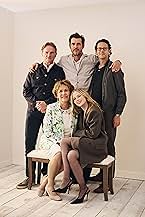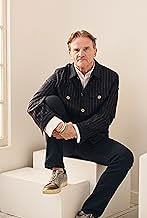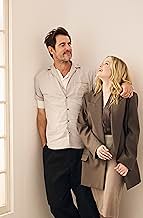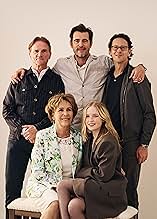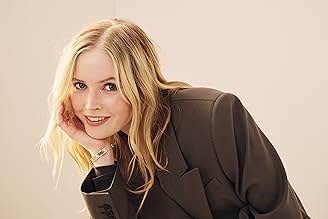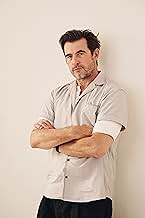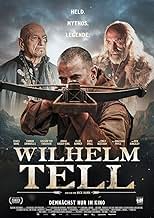Nella Svizzera del XIV secolo, un cacciatore un tempo pacifico guida il suo popolo alla ribellione dopo che la sua famiglia e il suo paese sono stati minacciati da un tirannico re austriaco.Nella Svizzera del XIV secolo, un cacciatore un tempo pacifico guida il suo popolo alla ribellione dopo che la sua famiglia e il suo paese sono stati minacciati da un tirannico re austriaco.Nella Svizzera del XIV secolo, un cacciatore un tempo pacifico guida il suo popolo alla ribellione dopo che la sua famiglia e il suo paese sono stati minacciati da un tirannico re austriaco.
- Premi
- 1 candidatura in totale
Riepilogo
Reviewers say 'William Tell' is lauded for its strong performances, stunning cinematography, and historical authenticity. The narrative of rebellion against tyranny resonates, though dialogue and pacing receive mixed feedback. Some find the script theatrical, and the middle section drags. Historical accuracy and character portrayals are debated. Despite these issues, the film's epic scope and emotional depth make it a compelling historical drama.
Recensioni in evidenza
I found this historical drama enjoyable enough, if of highly questionable historical accuracy. The anachronistic role of women and the racial diversity of the cast is forced, very distracting, provides an unnecessary backstory to the lead character and thereby detracts from the power of the story telling. The CGI, particularly in the water-borne scenes, is poor because it is not that well done, too noticeable and in most cases unnecessary. The film makers should instead have allowed the mountain scenery to work the magic. It is really beautiful although it is not authentically Swiss (the end credits reveal it was filmed in the Italian Tyrol). The violence and the battle scenes are handled competently. Look out for a leg being detached with a scythe and a genuinely stomach-churning and realistically portrayed through-the-eye stabbing. The famous shooting the apple scene comes about half way through and seems a bit incidental to the screenplay, perhaps inserted only because audiences will expect it. All in all, there's plenty to criticize but enough positive points to make it worth watching. The end scenes set up a sequel but actually make this film end awkwardly.
The movie is pretty poor, overall. But that's not what I'm here to flag... by far the most jarring aspect is they've lifted Al Pacino's Peach With Inches speech from Any Given Sunday, in parts practically verbatim, for Tell's rousing the troops before battle. WTF is that all about??
Not even a little bit, a nod to it, huge chunks.
"In any fight, it's the man whose willing to die..."
"You gotta look at the person sitting next to you, look in the eye and ask that person are you willing to die for me..." but delivered in the least inspiring, spine chilling way that it should make Pacino cry himself to sleep.
Not even a little bit, a nod to it, huge chunks.
"In any fight, it's the man whose willing to die..."
"You gotta look at the person sitting next to you, look in the eye and ask that person are you willing to die for me..." but delivered in the least inspiring, spine chilling way that it should make Pacino cry himself to sleep.
So... I came for arrows and rebellion.
I stayed for moody stares and dramatic cloak-swishing. And I left wondering: was this a freedom fighter or a medieval therapist with anger issues?
Claes Bang plays William Tell like he's auditioning to be the next Batman - dark, brooding, and emotionally constipated. The man shoots maybe one arrow, but delivers about 947 intense silences. Respect.
Ben Kingsley shows up and casually steals every scene with the smug energy of someone who knows this isn't going to win any awards - and doesn't care. Icon.
Highlights: Gorgeous Swiss mountains.
Enough slow-motion stares to power a shampoo commercial.
Historical drama that thinks it's Shakespeare but sometimes feels more like a LARP gone rogue.
Lowlights: Pacing so slow, I checked my pulse. Twice.
A hero with all the charisma of a wet log.
Dialogue so dramatic, it circles back to being hilarious.
Bottom line: It's not a bad movie. It's just very committed to being serious... even when it really shouldn't be. Like wearing full armor to a garden party.
Watch it with wine. Or snacks. Or while folding laundry. You won't miss much if you blink - or nap.
I stayed for moody stares and dramatic cloak-swishing. And I left wondering: was this a freedom fighter or a medieval therapist with anger issues?
Claes Bang plays William Tell like he's auditioning to be the next Batman - dark, brooding, and emotionally constipated. The man shoots maybe one arrow, but delivers about 947 intense silences. Respect.
Ben Kingsley shows up and casually steals every scene with the smug energy of someone who knows this isn't going to win any awards - and doesn't care. Icon.
Highlights: Gorgeous Swiss mountains.
Enough slow-motion stares to power a shampoo commercial.
Historical drama that thinks it's Shakespeare but sometimes feels more like a LARP gone rogue.
Lowlights: Pacing so slow, I checked my pulse. Twice.
A hero with all the charisma of a wet log.
Dialogue so dramatic, it circles back to being hilarious.
Bottom line: It's not a bad movie. It's just very committed to being serious... even when it really shouldn't be. Like wearing full armor to a garden party.
Watch it with wine. Or snacks. Or while folding laundry. You won't miss much if you blink - or nap.
I knew nothing about this film going in but sometimes taking a gamble and going in blind can pay off when you find yourself watching a hidden gem. "William Tell" however is just an average watch.
I found the film quite hard to follow because (like in alot of historical dramas) most of the strapping, bearded, heavily armoured warriors look the same, and there's way too many off them to keep up with. This might just be me. But it did have quite a slow pace overall.
There is some decent bloody action (especially toward the end) and alot of breathtaking scenery in the movie. But there are some questionable decisions too. Especially when it comes to some of the cast. With a promising ending for one of the characters not happening. While the ending overall isn't even an ending really.
I found the film quite hard to follow because (like in alot of historical dramas) most of the strapping, bearded, heavily armoured warriors look the same, and there's way too many off them to keep up with. This might just be me. But it did have quite a slow pace overall.
There is some decent bloody action (especially toward the end) and alot of breathtaking scenery in the movie. But there are some questionable decisions too. Especially when it comes to some of the cast. With a promising ending for one of the characters not happening. While the ending overall isn't even an ending really.
I watched the world premiere of William Tell at the Toronto International Film Festival (2024).
The presenter of the festival had said before the movie, "they don't make movies like this anymore". I assumed that was a positive thing.
Unfortunately, it really wasn't. The biggest issue of the movie was the language used.
This is a 14th-century period piece that involved the Swiss and Austrians. But for whatever reason the dialogue was written in something that sounded like a high-schooler's approximation of Victorian English.
According to the director, he wrote the dialogue to have language unique to the film. Maybe to assist in some sense of believability within this world. Instead the film was often hard to follow. Character motivations were lost in the flowery, disjointed language.
That being said - the cast did their absolute best with the film. Golshifteh Farahani, Connor Swindells, Rafe Spall, and Ellie Bamber were standouts.
Don't go to see the film for Ben Kingsley - he was barely in it and his performance felt completely phoned in.
If you're okay with 2-hours of mindlessness as you watch beautiful scenery and cool fight scenes - I think there is enough to enjoy.
The movie set up a sequel. I do hope it can be made, and some changes to how dialogue and character interactions are done will be made.
The presenter of the festival had said before the movie, "they don't make movies like this anymore". I assumed that was a positive thing.
Unfortunately, it really wasn't. The biggest issue of the movie was the language used.
This is a 14th-century period piece that involved the Swiss and Austrians. But for whatever reason the dialogue was written in something that sounded like a high-schooler's approximation of Victorian English.
According to the director, he wrote the dialogue to have language unique to the film. Maybe to assist in some sense of believability within this world. Instead the film was often hard to follow. Character motivations were lost in the flowery, disjointed language.
That being said - the cast did their absolute best with the film. Golshifteh Farahani, Connor Swindells, Rafe Spall, and Ellie Bamber were standouts.
Don't go to see the film for Ben Kingsley - he was barely in it and his performance felt completely phoned in.
If you're okay with 2-hours of mindlessness as you watch beautiful scenery and cool fight scenes - I think there is enough to enjoy.
The movie set up a sequel. I do hope it can be made, and some changes to how dialogue and character interactions are done will be made.
Lo sapevi?
- QuizDespite being a national hero in Switzerland, there is no concrete historical evidence that William Tell ever existed.
The earliest written account of the story appears in a 15th-century chronicle called the "White Book of Sarnen", more than a century after the events are supposed to have taken place.
Furthermore, the act of the hero shooting an apple from his son's head stems from the saga of Toko, who was a servant of the Danish King Harald Bluetooth, who died in 985. Likewise, Toko's story was written down more than two hundred years later, in the epic tale "Gesta Danorum".
Many historians view William Tell as a purely legendary figure, though his story was deeply embedded in Swiss national identity by the time of its writing.
- BlooperThe various castles are shown in their modern forms. Specifically, they have a large number of windows. These were all cut several centuries after the period in which the story is set, when castles were no longer required to be fortresses.
- ConnessioniVersion of Guillaume Tell et le clown (1898)
I più visti
Accedi per valutare e creare un elenco di titoli salvati per ottenere consigli personalizzati
- How long is William Tell?Powered by Alexa
Dettagli
Botteghino
- Lordo Stati Uniti e Canada
- 43.088 USD
- Fine settimana di apertura Stati Uniti e Canada
- 26.554 USD
- 6 apr 2025
- Lordo in tutto il mondo
- 680.624 USD
- Tempo di esecuzione2 ore 14 minuti
- Colore
- Mix di suoni
- Proporzioni
- 2.39 : 1
Contribuisci a questa pagina
Suggerisci una modifica o aggiungi i contenuti mancanti

Divario superiore
What is the Canadian French language plot outline for Guglielmo Tell (2024)?
Rispondi

